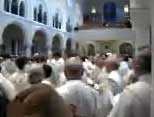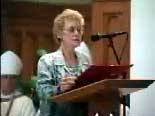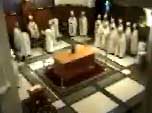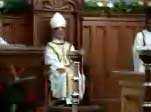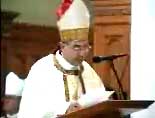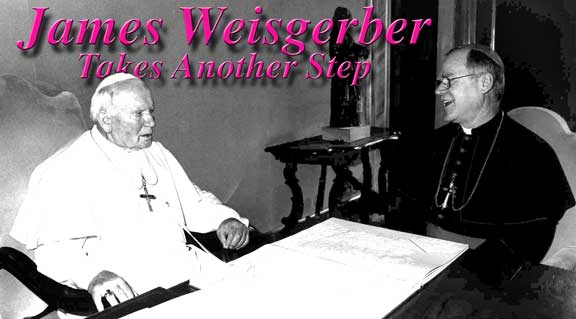 |
||
| FTLComm - Winnipeg - August 25, 2000 | ||
 In 1963 the twenty-five year old native of Vibank, Saskatchewan was ordained as a Roman Catholic priest. Not such an unusual event because the communities of Francis, Sedley, Vibank, Candiac, Momartre have a solid Roman Catholic tradition since those areas were settle. Less than an hour's drive South East of Regina, a series of small frugal communities, very much a part of rural flat land Saskatchewan. One morning as dawn occurred two ladies riding in the CN passenger coach of train "five" were seeing the Canadian prairies for their first time. I was just awakening as the train rumbled along and made its stop at Vibank and headed for Davin. "What a shame!" remarked one of the ladies, "That they would cut them all down." As the ladies lamented the removal of the prairie forest it makes one realise that where you come from can make all the difference in what you see and understand. Most assuredly trees did grow on the Regina Plain but that would have been before the dinosaurs and the formation of lake that was essentially a massive inland sea. James Weisgerber is a prairie person, he understands the sky, sunsets, seeding and harvest and most importantly he understands the people who live and work on that land. His |
||
| view has hardly been one confined to this part of the world because prairie people have no choice but to expand their horizons and look beyond. Certainly his work in the church as a parish priest, then moving up the organisation to be Bishop in Regina and then in Saskatoon, while spending a few years as the English speaking secretary general of the Canadian conference of Catholic bishops, gave him something of a wider experience. But there is more, Weisgerber was deeply involved in the ecumenical movement bridging the difference between Saskatchewan church leaders and taking on national and international issues with joint reports and position papers on matters of importance. |
|
|
|
|
How completely fitting it was that yesterday he would be installed as Archbishop of Winnipeg. His installation ceremony was carried live around the world using new Internet streaming technology that broadcast the pomp and ritual of the service to viewers everywhere. It is believed that among those who tuned in was Pope John Paul. |
|
|
|
The Roman Catholic Church in Winnipeg viewed this investiture as remarkably important and wanted to share it with the world. They went to MidCan productions in Winnipeg who provided camera men, sound technicians and the former computer guru from FTLComm, Andrew Shire, to stream the video and audio signal both low speed and high band so that viewers everywhere could share the experience. |
|
|
|
The Cathedral in Winnipeg, though a huge and beautiful place could not possibly hold
the large crowd and the nearby Delta Hotel handled the overflow with a big screen
television. These images were taken from the live broadcast seen here in Tisdale between six and seven thirty Thursday. The Roman Catholic church because of its huge world wide following is a multicultural community and so often priests, Bishops, Archbishops and Cardinals all seem to be foreigners. The man speaking as seen on the left is just one such example, his speech was |
|
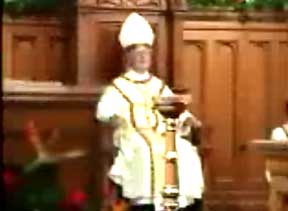 clearly spoken into the microphone yet few if any could have understood what he was saying. Though it seemed he was speaking English as a phrase or two could be made out, it was utterly clear that his native language was something else. For centuries the Catholic church has chosen its leaders from Italy. Some like Pope John opened the door to make Christianity accessible, while others like Pious the Twelfth bore the reputation as collaborators with both Fascist Italy and Nazi Germany as apparent willing supporters of the extermination of Europe's Jews. It was only in modern times that the Church took the major step to let the leader of their church be something other than an Italian and Pope John Paul, the worlds first Polish Pope, came to office and yet another major step was taken in moving the church forward. Pope John Paul has been on a plane travelling around the world ever since and though he did not include |
||
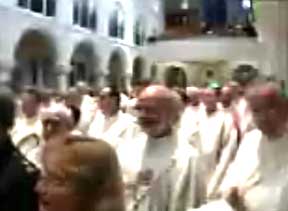 the Church's despicable conduct during World War II, he did issue one of the most sweeping apologies for the misbehaviour of the church throughout time. It is so fitting that James Weisgerber move up the ladder in the hierarchy of this formidable force that is the Roman Catholic Church. Not just to be a Western Canadian in the role of Archbishop, but to move forward the expansive and more encompassing view of the world that is available from a boy who grew up in Vibank. The recognition of the importance of this event was evident in the remarkable cast of people who attended the investiture including Manitoba's premier and Lt. Governor, the Mayor of the city and a sort of "who's who" in Winnipeg were on hand to witness this event. |
||
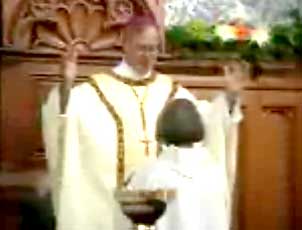 When Marshall MacLuhan spoke of the "global village" in the 1970s I certainly did not understand what he was talking about and I doubt if others did as well. Clearly we knew that television and radio were able to involve us in the events around the world as we had seen and experienced the war in Viet Nam on a personal level just because of t  elevision, but MacLuhan was eluding to something much more and as I watched
my computer screen and listened to the speeches and singing, the full blown sound
of a complete orchestra I was included. Though not a Catholic I could appreciate
the significance of this event and while the pictures and sound came to me I could
at the same time drift off to other web sites to read and consider the remarkable
career and accomplishments of James Weisgerber. elevision, but MacLuhan was eluding to something much more and as I watched
my computer screen and listened to the speeches and singing, the full blown sound
of a complete orchestra I was included. Though not a Catholic I could appreciate
the significance of this event and while the pictures and sound came to me I could
at the same time drift off to other web sites to read and consider the remarkable
career and accomplishments of James Weisgerber. |
||
| Sincerely Timothy W. Shire |
||

